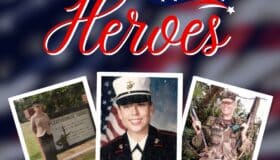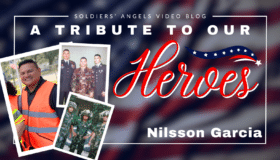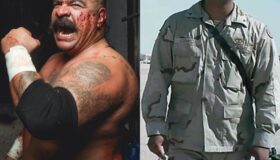TRIBUTE TO OUR HEROES: Army Veteran David Avila
November 12, 2024
In the latest episode of “A Tribute to Our Heroes,” we talk with Soldiers’ Angels volunteer and Army Veteran David Avila. David joined the Army twice in his life, at the ages of 18 and 44 and has been a Soldiers’ Angels volunteer for seven years.
David shares his background, military career, returning to civilian life, and finding purpose through giving back to other Veterans.
You can view our full video interview with David below.
Q: What was your first enlistment like?
A: Well, it was peacetime and I was stationed at Fort Cavazos. My job was quartermaster and chemical specialist because there were too many of us, so they had me in the office working with the First Sgt., working in administration, and the motor pool, I was in charge of thousands and thousands of dollars worth of equipment. I was doing an E6 job being paid as an E4. I did a lot of extracurriculars. I was in charge of funerals, color guard, drill team, and the volleyball team; they had me pretty spread out.
Q: So after your first four years, what did you do and how did you go back?
A: I was supposed to go to Germany, but that didn’t happen, so I went to Georgia. My brother and his wife were there. We moved in, me, my wife, and my daughter. I had been to Georgia before when I was a kid. I actually ran into a couple that I knew as a kid. They invited me and my family to church. I’d never been to a church besides a Catholic church. So here I am with 5,000 people in a big old church. I didn’t last that long in Georgia; I had a calling. I didn’t know what that meant, but I knew God wanted me to go back home. So we packed up and went back to San Anton’. We ended up staying with my dad for a little bit. My stepmom said, “David, Gasper is calling for you,” and I said, “Gasper? I haven’t seen Gasper in years! How does he know I’m here?” He said, “David, I want you to come to our church.” A few months later, I became a youth minister. I was being called to come and work with the youth. I had about 30 teenagers and all we did was talk about the Bible. I wasn’t the kind of minister who would try to use a storyline, but a lifeline to lead them in the right direction.
Q: When did you have the calling to go back into the military? What led up to that?
A: My son, David, was almost a year old when 9/11 happened. We were sitting in the den, and I was holding him and watching the TV in awe. Not long after that, we went to a job fair, and I saw a recruiter and thought, “Awe, what the heck, let me go see.” So I went up to them and told them, “I’m prior service, and I’d like to reenlist and go fight in Iraq.” He asked how old I was. I told him 44, and he told me the cutoff is 37. So I asked him, “If I give you my DD214, will you do your job, and we’ll go from there?” Nine months later, I was at MEPS, passed everything, and swore in. Three months later, I’m in Iraq. I had been a Corporal but came back as a PFC. A 44-year-old E3, no respect. But I’d tell them, “This old man is going to protect you when we’re over there, so be careful how you talk to this old man.” But those kids became my friends, and they realized I’m for real, that I came back in, and that says a lot… We went to Fort Sill, Oklahoma, to prepare for war. Had to go to all these extensive trainings, which was a waste of time because of the temperature. We trained there for a few months and then boarded. We stopped in Ireland, Italy, and Kuwait. Once we got to Kuwait, we got set up and then had to wait while they got a place set up for us in Iraq. Some of us went by convoy, and some by Chinook. My job there was to fix machines like for fuel stations. My machines would take the fuel out and put it into the vehicles.
Q: What were the differences between the transition out of your first enlistment and the second?
A: Getting out of the military after four years, I realized my job wasn’t going to be the same as it had been. Having to adapt to a civilian job was hard. When I came back in, after getting out of the hospital system, transitioning to a civilian job again was difficult. You’re trained to be a certain way in the military, so you take that with you to your civilian job. But corporate places don’t understand that, so they try to manipulate and change the way you do and see things. I was doing telephone sales for a while. I had no idea what telephone sales was. My first job was to go get contracts and have people change their phone plans. In that transition, I’d think, “I never did this stuff in the Army,” but I ended up doing pretty good for myself and made pretty good money. If a Colonel after 20-plus years gets out, transitions, and starts looking for jobs, what is he going to look for? A CEO? It’s difficult because you have 20-plus years in the military and then come out and it’s like “What kind of job can I do?” I know a lot of Colonels and Majors, and their position is horrible. You’re making all this money in the military, and then come out and have to take a pay cut. Then you don’t have the benefits or anything. Transitioning not just from a job aspect, but the expenses. In the military, you have medical coverage, housing, everything. So when you become a civilian, you have to find a company that provides all of that.
Q: Do you think that through your second deployment and seeing combat affected you outside of your service?
A: It did affect. I think what stuck with me the most was that baby and the lady. I remember my son was 4, going on 5, and I took him to see Spiderman. We were sitting in the theater, and this was when I first realized I had PTSD. There was an explosion and fire. I stopped breathing for a split second, I had to make myself breathe again. My son looked at me and I had to try to refocus on this movie and then had to see if I could sit through this movie after seeing that. That’s when I realized it really affected me. I got all this medication, but I don’t take the medication that was prescribed to me because I found myself ‘zombied out’ and not living life. So I do everything for myself, training my body to accept and erase those things. That’s been going on for 20 years now.
Q: Would you say that between now and then you’ve found a way to move on? To cope?
A: Right now, one of the things that really, really helps me cope is that I have a lot of stuff going on. I love to do what I do. Soldiers’ Angels has opened a whole different type of door for me. I’ve always wanted to do things for my Veterans and their families. Soldiers’ Angels has actually given me the opportunity to do what I love to do, give back to my Veterans. I remember a time when I didn’t know where I was going to get my food from. I do get paid, but there was a point where everything was overwhelming, but Soldiers’ Angels came through, they gave me groceries, and they took care of me. That’s the thing about Soldiers’ Angels. They take care of our Veterans. That’s why it’s so important to me to be a part of this organization. As long as we can do something for our Veterans, I’m there. No matter what it is, I’m there. So thank you to Soldiers’ Angels for giving me that opportunity.
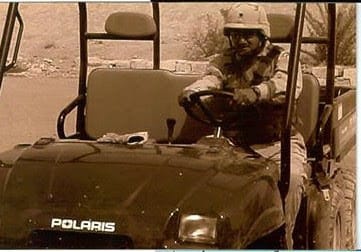
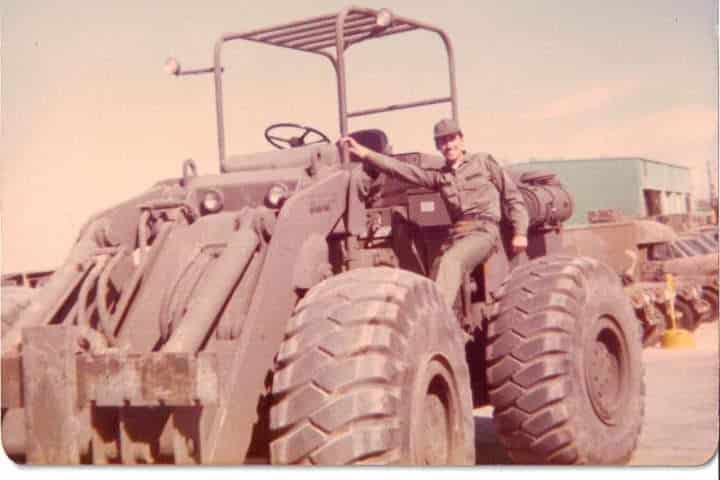
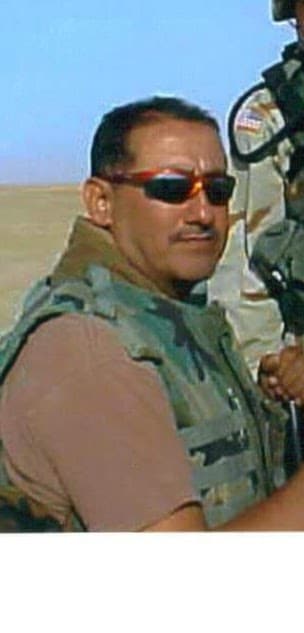
Want to watch more? Click here to watch more vlogs from the Tribute to our Heroes series.
